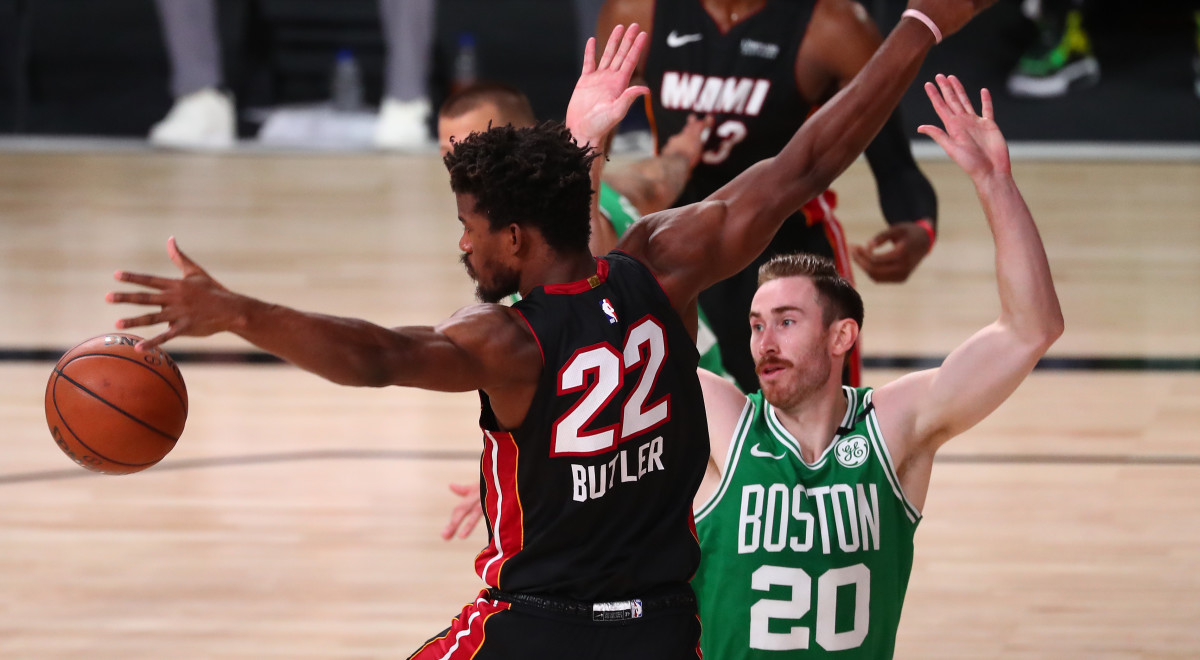Gordon Hayward's Return Helps Celtics Claim Game 3
BOSTON – Three thoughts on Boston’s 117-106 win over Miami in Game 3 of the Eastern Conference Finals …
Facing adversity, Boston responded
Much was made about the Celtics' heated locker room following Thursday night’s Game 2 loss. Had the dysfunction from last season returned? Was this where Boston unravels? The young Celtics seemed poised to collapse against a Heat team that had absorbed just one loss this postseason. Instead, Boston responded with one of its most complete games of the playoffs.
ROSENBERG: Marcus Smart Shouldn't Be Blamed for Locker Room Outburst
Offensively, Boston was sharp, shooting 48.2% from the floor and 34.6% from three. On the other end, the Celtics held the Heat to 38.8% shooting and a dismal 27.3% from beyond the arc. They scored 60 points in the paint to Miami’s 38. Jayson Tatum and Jaylen Brown combined for 51 points. Kemba Walker chipped in 21. Marcus Smart added 20, but it was how he scored that mattered most. After attempting 19 three-pointers in the first two games, Smart put up two in Game 3, adopting a playmaker role (six assists). And when the game got tight in the fourth quarter, Smart was perfect (10-for-10) with his free throws.
“Our whole team was aggressive,” Brad Stevens said. “Our whole team played with the right mentality.”
Erik Spoelstra said it: The Celtics just played with more force. They put aside the postgame squabbles from Game 2—and, really, a shouting match after a tough loss in a trying environment is a far cry from the Kardashian-level drama that plagued the locker room last season—and responded, something Stevens said he fully expected.
“I was curious to see what was going to happen tonight,” Stevens said. “But I didn’t have much doubt.”
Paging, Jimmy Butler
Butler’s stat line—17 points, eight rebounds, 6-for-13 from the floor—was solid but the All-Star swingman seemed to coast through the first three quarters, turning it on, briefly, with a seven-point spurt before being curiously pulled from the game in the final minute. Spoelstra said there was no injury issue, that Miami was “just trying to get something quick right there at the end.”
Butler is never going to be a volume shooter—his attempts in Game 3 (13) line up with average during the season (13.1) and the playoffs (12.4)—but the Heat need him to be more assertive early, particularly when the three-point shots aren’t falling. Butler can get to the rim and create his own shot, while he ranked in the top five in the league in free throw attempts during the regular season. Miami has the shooters that can dig them out of virtually any hole (“A 17-point lead against them is really eight,” Stevens said) but they need Butler to be more of a factor early to keep the Heat from falling too far behind.

Welcome back, Gordon Hayward
It has been more than a month since the Celtics had Hayward, who has been sidelined since spraining his ankle in Game 1 of the quarterfinals against Philadelphia. And he had an immediate impact. The numbers—six points, five rebounds, four assists in 31 minutes—don’t jump off the page, but Boston’s offense clearly operated smoother with Hayward in the game.
AND ONE ‼️ pic.twitter.com/VU9UNyI5nt
— Boston Celtics (@celtics) September 20, 2020
“I didn’t expect to play him that much,” Stevens said. “I thought he looked pretty good … he’s a stabilizing force for our team.”
With Hayward back, Boston tightened its rotation. Tatum, Walker and Brown played 40-plus minutes, Smart and Hayward were in the 30s while Daniel Theis finished with 24. No other Celtic played more than nine minutes. Hayward’s presence gives Boston another playmaker—Hayward had a nice pocket bounce pass to Theis early and found a couple of teammates for open threes—as well as another shooter for Miami to track. The rare in-series break (Game 4 isn’t until Wednesday) should benefit Hayward, who admitted to being exhausted and sore after the game.
It will be difficult for Hayward to get back to his pre-injury conditioning level in this series, but Boston doesn’t need the midseason version of Hayward. What Hayward brought to the mix on Saturday is enough.
